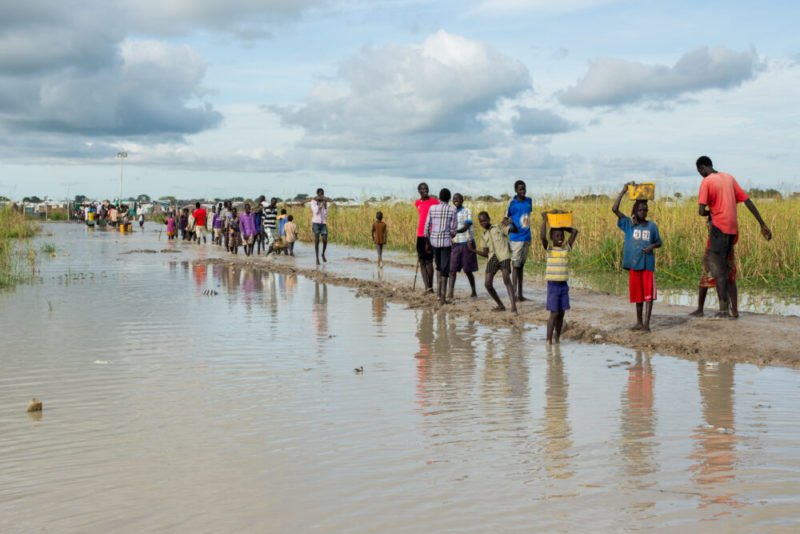Internal Displacement: How long before we end their suffering?

“I said no, to the stormy weather that was approaching our home.
I had grown within these four walls, with friends amongst the chickens and horses on the farm.
It broke our home into so many pieces, and I wasn’t allowed to put it all back;
Or take some back with me.
To this new place, with no chickens and horses, no glitter in the dark.
My friend didn’t survive. She wanted to grow up and be a doctor. She wanted to save the world.
My brother was lost for many days, I don’t know how to count still.
I was supposed to start school the coming week.
He was found later, by a tall man with a red star in his white t-shirt.
He didn’t look well, but he was happy to see us.
Maa and Paa told us that we have to move ahead.
There would be new laws, and some might be for a lesser time.
But for now, everything given to us was counted.
I don’t want to become a doctor. That was my friend’s dream.
I want to stop the stormy weather that will destroy other peoples’ homes.”
Nothing seems to hit harder, than the idea that human suffering is often caused by human beings themselves. IDPs (Internally Displaced People) have been largely debated upon and their situation cannot be stressed upon, any more than it is right now. It’s brutal, that they have to move. It’s brutal, that they have to focus on concepts that were never meant to define them. Aren’t we all born with the notion that we will remain grounded to where we were birthed, that our identity is often built on the situations we face, and the trauma we go through?

So as to say, IDPs are victims of many causes. Their lives become part of a system of barter, where their lives are reduced to numbers, easier management laws and the legislative system of the government. They survive the cruellest of all situations due to their resilience, their strength and their capacity to be hopeful, no matter how dark it gets.
They’re thrown into conflict zones. They become engaged in areas where displacement often becomes the price they have to pay, in order to survive. Whether they are safe homes, make-shift shelters or a livelihood source they had never tried before, they take problems as they come. And maybe that’s their weakness, but its also their strength. Its what helps them survive.
A nexus has to be arrived at, for we fail to account for thousands of lives left at the hands of landslides, flash floods, proxy wars, severe snow and sleet, utilization of cheap resources for capacity building, lack of safety measures, lack of durable solutions to help aid their existence in a safe and sound manner. A nexus must be reached at, from where climate change, armed conflicts, civil wars and international borders don’t cause the death of a conscience that needs to exist, for humanity’s survival to persist. A nexus must be found, because refugees, IDPs and migrants remain at the risk of extradition, legal regulations of the host country, policies that may not fall in line with international treaties, unpredictable weather, lack of good practices, lack of preparation for mitigation of disasters and causalities that put the very air we breathe in, at risk.
Systems of early warning, prevention, early response and recovery to focus on that response have to be better built and administered. Development projects often have large-scale impacts on the environment. This affects resettlement processes, and questions the resource-availability of the environment to prevent the impoverishment of affected persons. Advocacy for such mechanisms must be addressed, and Member States have to be sensitized to handle such situations, while deeply protecting and promoting human rights of IDPs in the region.
Internal displacement and climate change are correlated. Disaster displacement adds to the concept of bringing along more trouble. Unplanned growth is high, in comparison to the coping capacity of people which is low. Urban growth is high, in comparison to mitigation and prevention mechanisms which is less. Internal displacement and aid for IDPs require a combination of both technical and political solutions. The Member States must actively engage with all actors and humanitarian peacebuilders to help overcome such crises.

It is very crucial to understand the displacement cycle. Early responses could help lessen the impact or at least brace for it. During the process of displacement, adjustment measures can be taken to tackle the ongoing impact of the disaster (whether it is a natural disaster or one created by man). Post the disaster, displacement might have taken place. Yet, existent measures in place can help adapt to the change in environment, resources, culture, region and promote social inclusion, preventing social exclusion.
If people are forced to leave their homes, adequate resettlement options and measures must be kept in place. Sometimes resettlement is slow, and sometimes it may not happen completely. The roadmap to preventing displacement is a complex mechanism. The long-term impact of displacement has to be taken into consideration. Displacement is not inevitable, but it can be avoided or dealt with. Food security, safety and security must be provided for IDPs. They are human beings after all. They shouldn’t be discriminated against due to their origin, gender, race, nationality, culture, disability, religion or colour.
Broken homes, tiles scattered in pieces across the floor, and the family that struggles to stay in one space forever. How long does forever mean anyway?



















